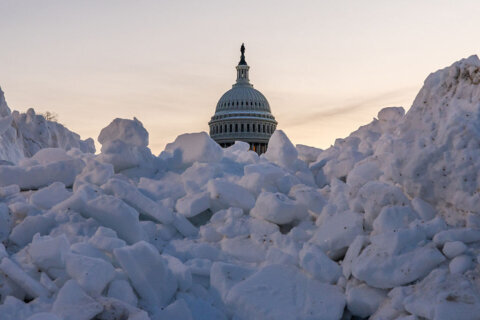As the election year gears up, voters will likely be inundated with political ads. But how can you know all the images and sounds shown are real and not deepfakes generated by artificial intelligence?
Stories about deepfakes of political candidates have already made headlines, including fake robocalls using President Joe Biden’s voice in New Hampshire or fake images of former President Donald Trump hugging Dr. Anthony Fauci.
“This is the first time we’re going to be facing these deepfake misinformation campaigns,” said Craig Holman, a registered lobbyist who focuses on ethics, lobbying and campaign finance rules for watchdog group Public Citizen. “There’s very little regulation and disclosure happening.”
Public Citizen is pushing for legislation in numerous states, including Maryland, to require transparency for political ads that include deepfakes.
The bipartisan Maryland bill, HB 872, would require campaigns and other political entities who produce artificial intelligence-generated content to clearly label and disclose that it is fake content.
It would only apply 90 days before the election, if passed.
A similar bill, SB 978, was introduced in the Maryland’s Senate earlier this month. In neighboring Virginia, House lawmakers in Richmond passed a comparable bill too.
“When we get right down to 60 or 30 days before an election and a deepfake goes viral, it’s going to be very difficult for candidates try to correct the record,” said Holman.
There are First Amendment concerns though when it comes to political speech — even when it involves material generated by artificial intelligence.
Holman said the Maryland bill takes some precautions, such as making exemptions for parody or satirical deepfakes and not outright banning them in political ads like some states or requiring disclosure.
Six states have already passed legislation surrounding deepfakes, with most requiring ads be labeled like the proposed Maryland legislation (SB 978): “THIS VIDEO HAS BEEN ALTERED OR MODIFIED THROUGH THE USE OF COMPUTER PROGRAMS TO DISPLAY AN EVENT, A SOUND, OR AN IMAGE THAT DID NOT OCCUR.”
Texas and Minnesota have outright banned deepfakes in political ads right before an election.
“Transparency is what we’re pushing for,” said Holman.
Of course, many deepfakes are produced outside the jurisdiction of the state, in other countries.
The first hearing for HB 872, the bipartisan Maryland House bill addressing the disclosure of using synthetic media is campaign materials expected on Tuesday.
Get breaking news and daily headlines delivered to your email inbox by signing up here.
© 2024 WTOP. All Rights Reserved. This website is not intended for users located within the European Economic Area.








